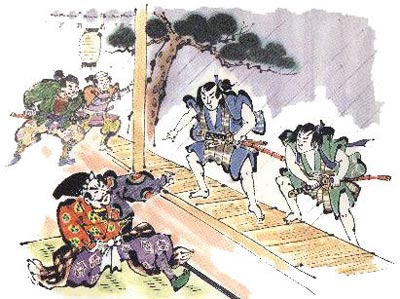| SOGA MONOGATARI |
| Play title | Soga Monogatari |
| Author | Okamoto Kid˘ |
| History |
"Soga Monogatari" was premiered in October 1914 at the Meijiza [casting]. |
| Key words |
Fujisan Jidaimono Kud˘ Saemon Suketsune Mank˘ Gozen Shinkabuki Soga Gor˘ Tokimune Soga Jűr˘ Sukenari Sogamono |
| Summary |
The brothers Jűr˘ and Gor˘, sons of Kawazu Sabur˘ Sukeyasu, had grown up with only one aim in mind, that of avenging the death of their father by killing Kud˘ Suketsune who had been responsible for their father's murder. The time has finally come. The youths have learned that Kud˘ Suketsune is to be in the hunting party of the shogun, scheduled to be held on the foothills of Mt. Fuji. They feel that the camp of the hunters will provide an excellent opportunity for them to approach and kill their enemy. With this in mind, the brothers had gone to pay a last visit to Mank˘, their mother. At the same time, quite by chance, the two youths' younger brother Zenjib˘, who had been born just after the father's death and had been entrusted from infancy to a temple to be brought up as a priest, had also come to Hakone from the distant land of Echigo, for the purpose of paying his respects at his father's grave, and to make an opportunity for the young acolyte Zenjib˘ to meet the abbot of the temple where the grave is located. When the curtain opens, Jűr˘, the elder brother, and Zenjib˘, are seen resting not far from the lake of Hakone. At this point, they are accosted by Ky˘ no Kojir˘. Kojir˘ had also come by chance to visit Mank˘, who is also Kojir˘'s mother from an earlier marriage. After the death of Kojir˘'s father, Mank˘ had married Kawazu Sabur˘ Sukeyasu, and Kojir˘ had been adopted and brought up as Kawazu's son. Having heard from Mank˘ that Jűr˘ and Gor˘ had visited her, he had come chasing after them, eager to take the opportunity of meeting them again. Zenjib˘, who does not remember Kojir˘, is introduced by Jűr˘ and a reunion takes place. After Zenjib˘ has gone off to meet the abbot, Jűr˘ bares his plans to attack Suketsune during the hunting party on the Fuji slopes, and asks Kojir˘ to lend a helping hand, because Kojir˘, although born to a different father, had been brought up as Kawazu Sabur˘ Sukeyasu's son. Kojir˘, however, desists. He is aware of Jűr˘ and Gor˘'s determination, and feels that if they feel they must expend their lives on that purpose, he cannot deter them. He sympathizes with their cause, and wishes them well, but cannot bring himself to sacrifice his own life for the same purpose. He gives as his excuse the fact that his own father is not Kawazu. Jűr˘ is dejected, as he had hoped to gain Kojir˘'s aid. However, he does not persist, because he realizes that Kojir˘ has his point. But fiery Gor˘, who had been listening in from behind a stone statue, is angry. He topples over the stone idol so that it almost falls on Kojir˘. Gor˘ comes out, accusing Kojir˘ of cowardice and lack of the samurai spirit of duty and obligation. Jűr˘ restrains him, while entreating Kojir˘ to at least not reveal their secret plans to others. Kojir˘ agrees. In the meantime, Zenjib˘ returns from his visit with the abbot. For the first time in years, all four brothers are reunited. Zenjib˘ tells of his meeting with the abbot, and says that the abbot spoke of having presented Jűr˘ and Gor˘ with a gift of swords. Although the abbot had said nothing more. Zenjib˘ suspects that the gifts had been made because of the fact that the brothers are going out on their vendetta soon. He asks Jűr˘ and Gor˘ to allow him to accompany them. However, Jűr˘ and Gor˘ refuse, saying that Zenjib˘ had been brought up as a priest and would only hamper them in their attack on Suketsune. They sadly deplore the fact that the brother that they had hoped would accompany them had refused their plea, and the brother that they must refuse should offer to go with them. Jűr˘ and Gor˘ head off together toward the Fuji hunting grounds, reconciled to the fact that, as it had been all through childhood, it is just the two of them alone. Zenjib˘ and Kojir˘ send them off sadly. Kojir˘ for a moment wavers again, his love for the brothers almost forcing him to give up his decision to remain behind. Zenjib˘ takes out his prayer text and begins to pray before the stone Buddha. Tora, geisha sweetheart of Jűr˘, comes to the scene. She had come for a last farewell, but she is resigned to the parting and makes no effort to chase after the departing brothers. Seeing Zenjib˘ praying, she sits behind him to join him in his prayers. It begins to rain, and she silently shelters him with her parasol-hat. Kojir˘ comes leading a horse. Together, he and Tora stand silently listening to the fall of the rain, the cry of the mockingbird, and the voice of Zenjib˘ murmuring his prayer. Source: the Minamiza December 2003 program (many thanks to Trevor for his help on this drama!) |
 |
|
The Soga Brothers against Kud˘ Saemon Suketsune |
|
|
| Contact | Main | Top | Updates | Actors | Plays | Playwrights | Programs | Links | FAQ | Glossary | Chronology | Illustrations | Prints | Characters | Derivatives | Theaters | Coming soon | News |